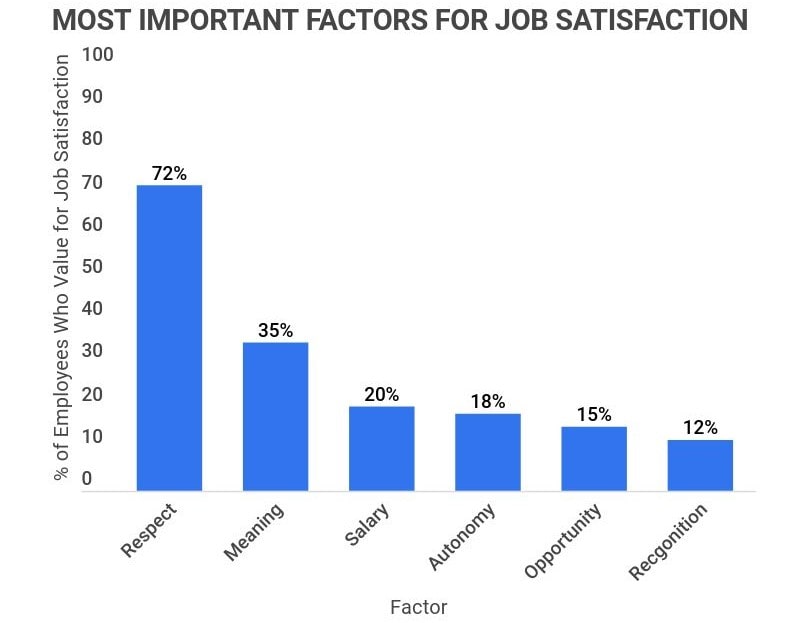Research Summary: There are many ways in which businesses try to improve productivity, employee loyalty, and workplace culture. However, a surprising amount overlooks the importance of employee happiness.
But how much more productive are happy employees?
To find out more, we’ve gathered all of the essential trends and statistics about that and many other benefits of employee happiness. According to our extensive research:
-
Happy workers are 13% more productive.
-
Happiness salespeople increase their sales by 37%.
Essential Happy Employee Productivity Statistics
To find out just how important employee happiness is, here are the essential statistics you should know about:
-
Happy and engaged employees have an 18% lower turnover rate.
The shocking thing is that only 36% of US employees are engaged in the workplace, meaning that most employers are missing out on these reduced turnover rates.
-
Happy and engaged employees have 41% lower rates of absenteeism.
This is because happy and engaged employees feel recognized by their employers, who implement policies that allow for employees to be heard and cater to their employee’s mental and physical needs.
-
The most important factor for job satisfaction is respect, with 72% of employees saying so.
This is then followed by meaning (35%), salary (20%), autonomy (18%), opportunity (15%), and recognition (12%). Ideally, an employer should consider all of these factors if they want to have happy employees.
For further analysis, we broke down the data in the following ways:
Productivity Statistics
Factor Share of employees who value it for job satisfaction Respect 72% Meaning 35% Salary 20% Autonomy 18% Opportunity 15% Recognition 12% -
Companies with happy employees receive 2.3% better returns per year.
The increase in productivity happy employees bring leads to better returns for companies. 2.3% might not seem like a lot, but that’s the difference between a company making $50 million or $51.1 million. Imagine what you could do with that extra million.
-
Customers who experience great customer service are 10-30% more loyal than customers who don’t.
Customers who interact with happy and engaged employees are far more likely to return to your business, and given that 65% of a company’s business comes from existing customers, this is an important priority.
-
38.9% of workers are unhappy because they’re not being paid enough.
While this is the number one detractor of employee happiness, there are many other reasons employees are unhappy as well. Others among the top five include: having no room for progression (36%), having poor company culture (30.8%), poor work-life balance (21.8%), and having a boring daily routine (18.7%).
Reason for unhappiness Share of employees Not paid enough 38.9% No room for progression 36% Poor company culture 30.8% Poor work-life balance 21.8% Boring daily routine 18.7% Disliking the working hours 15.3% Disliking the boss 14.9% Having a long commute 13.6% Disliking colleagues 5.0% Issues in private life affecting work life 4.8%
Employee Happiness and Productivity FAQ
-
Are happy employees more productive?
Yes, happy employees are 13% more productive on average. Further, happy employees can be up to 20% more productive than their unhappy counterparts.
This productivity manifests in reduced absenteeism, lower turnover, loyal customers, and ultimately better returns for companies.
-
What are the benefits of happy employees?
There are many benefits that come with happy employees. These include
-
13% higher productivity
-
37% more sales
-
18% lower turnover rate
-
41% lower rates of absenteeism
-
2.3% better returns
-
10-30% more loyal customers
And other less tangible statistics, like improved working hours for employees, better company culture, and more.
-
-
Do happy employees stay at their companies longer?
Yes, happy employees are 44% more likely to stay at their jobs longer than unhappy employees. More specifically, this stat represents engaged employees vs. unengaged employees, and since happy employees are more likely to be engaged, they’re also more likely to stay with the same company for longer.
-
Why are happy employees more productive?
Happy employees are more productive because they’re more engaged and show up to work more often. This allows these employees to work more effectively when they’re at work, even if they aren’t usually working more hours outright.
Ultimately, being more engaged and productive in the workplace increases company profitability by up to 21%.
Conclusion
Far from being an intangible goal to aspire to, employee happiness is a very real factor that can benefit or hinder business productivity. Happy employees are 13% productive on average due to the fact that they’re more engaged and take fewer days off.
To maintain this happiness, companies should prioritize giving employees more respect, autonomy, opportunity, and recognition, even more so than just a higher salary.
When these factors are improved, employee happiness will rise, and companies may see the many benefits that follow.
References
-
University of Oxford – Happy workers are 13% more productive
-
Hubspot – Why Our Formula for Success Is All Wrong
-
Gallup – Dismal Employee Engagement Is a Sign of Global Mismanagement
-
Applause – How to Lower Absenteeism by 41% with Employee Engagement
-
The Telegraph – Are happy workers more productive?
-
Smile.io – How Employee Engagement Leads to Customer Loyalty
- Statistics
- Employee Retention Statistics
- Happy Employees Are More Productive
- Workplace Distraction Statistics
- Average Freelancer Rates
- Average Working Hours
- Offboarding Statistics
- Employee Productivity Statistics
- Workplace Microagression Statistics
- Employee Monitoring Statistics
- Employee Training And Development Statistics
- Lead Generation Statistics





